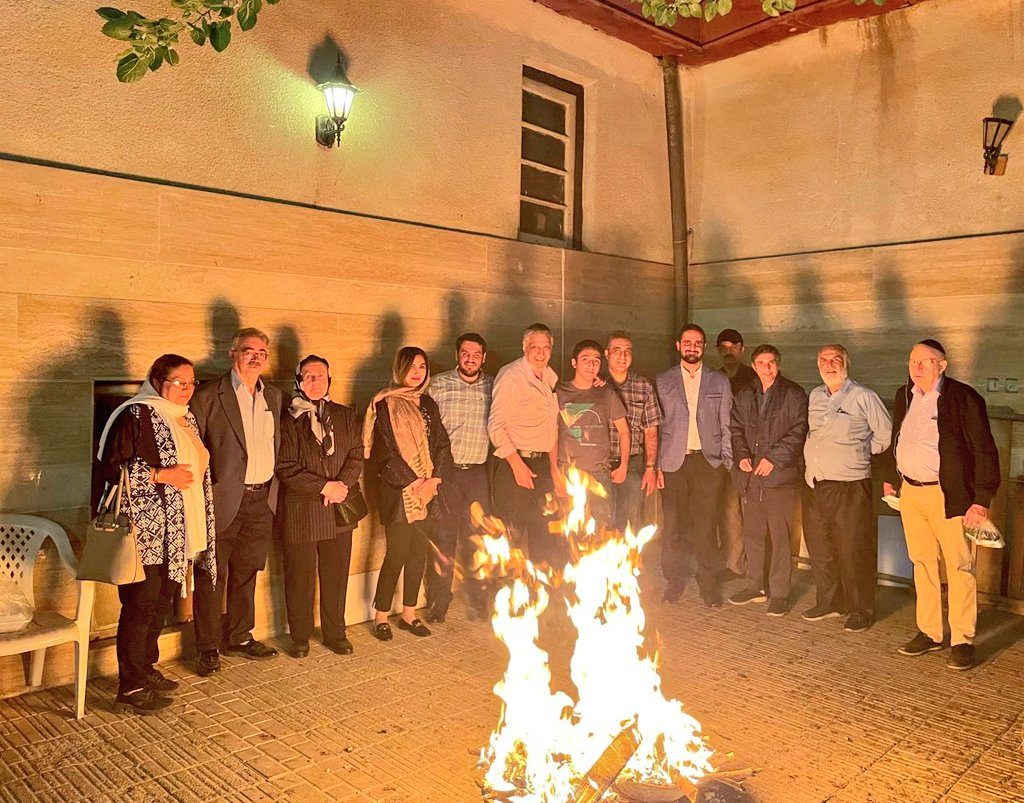Australia/Israel Review
Persian Paradise Lost
May 25, 2023 | Tammy Reznik

In 1979, when I was a child of seven, two equally terrifying television news stories were being cycled daily on our home TV – images of bloated abandoned children, victims of Pol Pot’s genocide in a place called Kampuchea (current day Cambodia), and recurring visuals of an intimidating bearded man named “the Ayatollah Khomeini”, who had stolen power in a far-flung place called Iran. According to the whispers that I heard in the living room of our suburban Melbourne home, this was not a good time to be in Iran, let alone a Jew in Iran.
Within the limits of my young mind, it never occurred to me you could be both Jewish and Iranian. I only knew of Jews who spoke Yiddish and ate gefilte fish and nothing of the thriving Jewish culture that spoke Farsi and ate Gondhi (a Persian Jewish dish of meatballs traditionally served on Shabbat).
As I stood there transfixed by the image of Iran’s new Supreme Leader on my TV in Melbourne, a young Jewish boy named Beni, the exact same age as me, stood with his parents, crammed in with tens of thousands at Teheran’s local airport, ready to welcome the returning exiled Ayatollah and soon-to-be Iranian Supreme Leader as he disembarked from his personal aircraft.
Persian and Jewish – a life of contradictions

Beni Sabti: Iranian expat and leading researcher on the regime
Last week, I succeeded in tracking Beni down. Beni Sabti is now a social media and Iranian regime researcher at the Jerusalem Institute for Strategic Studies in Jerusalem. He was one of the founders of the IDF spokesman’s platform in Persian and acted as an advisor for Israel’s hit TV series “Tehran”.
Born in Teheran in 1972, he fled with his parents and siblings to Israel in 1987 in a harrowing escape that sounds like a movie script – complete with smugglers, long days traversing the desert, bribes and car chases.
I had so many questions – what was life like under the Islamic regime, how did you leave and is it even possible to get out now? I assumed the remaining Jews must be like prisoners – why else would any Jew remain in this repressive country whose government actively denies Israel’s right to exist and discriminates against Jewish citizens by law? Some of his responses surprised me.
Iran is indeed controlled by a regime which rules through fear and intimidation, and espouses hate and antisemitism, yet Jews remain there in sizeable numbers – the largest community in the Middle East outside of Israel. According to Sabti, “Their relationship [to Iran and the Islamic regime] is complex,” in some ways reminiscent of the social integration that was a factor in the life of the Jews in Germany on the eve of the Second World War.
“Jews in Iran”, says Sabti, “are Iranian first, they do not embrace change, and for some who have lived there for centuries, they are influenced by Iranian Muslim practices – there is a tacit exchange of traditions.”
Sabti says members of the community try to maintain a low profile and be physically indistinguishable from the wider society. They try to blend in to avoid unwarranted attention or being accused of disloyalty to the Iranian state – though a handful did participate during the protracted nation-wide protests that followed the death of Mahsa Amini last year. At least five Jews were arrested as a result.
A Community on a Tightrope
There are an estimated 8,000 to 8,500 Jews living in Iran today. Their life under theocratic rule – and the flight of the overwhelming majority of the Jews who once lived there – has led to the emergence of a community that is more religiously observant than that which existed during the more liberal era of the Shah, Sabti notes.
According to Iranian state policy, Jews are purportedly “free” to practise their religion, but this comes with caveats and limits. As a recognised minority, Jews are granted one token representative to the Iranian Parliament (Majlis) – which is dominated by Islamic clergy. Jews and other recognised minorities are barred by law from serving in Iran’s judiciary and security services or running for public office. They also cannot hold authority over Muslims in the armed forces. Like all Iranians, Jews must also abide by Islamic Shari’a law.
Iran has a number of synagogues and Jewish centres. The current Chief Rabbi of Teheran, Rabbi Yehuda Gerami, says his community has achieved some positive developments in recent years, like persuading Iranian authorities to let Jewish schools close on Saturdays for the Sabbath, the Jewish day of rest – which they previously were not allowed to do – and to renovate a Jewish ritual bath (mikveh) in Teheran. “Also, we now have about six kosher restaurants in Teheran, two in Shiraz and two in Isfahan,” Gerami said. “And we opened a Jewish seminary in Teheran.” There is regular attendance at synagogue and Jews mostly attend Jewish schools.
As recently as March, Gerami tweeted footage of Jews singing the Shoshanat Prayer at the end of Purim.
Yet a month later, the regime renewed public threats directed at the Jewish community – warning them to cancel traditional post-Passover Mimouna celebrations and join the regime’s vehemently anti-Israel and antisemitic al-Quds Day protest rallies (held on the last Friday of the Muslim holy month Ramadan).
According to Sabti, all the congregations chose to cancel Mimouna, while the Jewish representative in the Iranian parliament, Dr Homayoun Sameyah, joined the anti-Israeli al-Quds Day march. Dr Sameyah, a pharmacist by profession, was even quoted in Iranian media saying, “Every year there are important things for al-Quds Day, this day is very important not only for Iranians, but also for all nations.”
The long Jewish history in Persia
The Jewish presence in Iran dates back over 2,700 years, to the Babylonian exile, when King Cyrus the Great conquered Babylon in 539 BCE and allowed many Jews in exile there to return to their homeland in today’s Israel, while others remained in the Persian empire. The traditional Jewish Purim story, involving Esther and Mordechai, is set in Persia during the reign of one of Cyrus’ successors.
At its height, just ahead of the Islamic Revolution, the then-thriving Jewish community in Iran numbered approximately 80,000 individuals.
The tensions between the loyalists of the Shah and opponents, including the Islamists, throughout the 1970s sparked the beginning of a mass-migration of Iranian Jews even before the 1979 Revolution led to the establishment of a theocratic government under Khomeini. The new constitution recognised Jews as an acknowledged religious minority, granting them certain rights, but it also imposed various restrictions on them. Some of the remaining Jews tried embracing the revolution and the nation’s new rulers – some 5,000 of them even took part in the Ayatollah’s official welcoming ceremony following the revolution.
Yet, as devoted as they were to their ancient Persian heritage, around half of the Persian Jewish community fled Iran within the first few months after the revolution. The outbreak of the Iran-Iraq War (1980-1988) saw another mass migration.
It was during this period that life became increasingly harder, stricter and more threatening, Sabti recalls. Gaining access to government services like passports became near impossible.
“We were regularly threatened or bashed for no reason. Everyone in Iran suffered. But the Jews suffered more,” says Sabti. “From time to time,” he recalls, “IRGC [Islamic Revolutionary Guard Corps] officers would come to Jewish shops and intimidate or arrest.” Sick of the fear and beatings, Sabti decided at age 14 to join the ranks of the IRGC himself! It was the only way to stay safe. “They didn’t care who you were as long as you pledged allegiance to the State,” he says.
The tipping point came in 1986, when Sabti’s father was the victim of a hit-and-run accident. The family looked for a way out. It took a year to finally leave, and they had to do so illegally via smugglers. “Today it is different,” says Sabti, “but you do need to have both contacts and money to leave.”
Anti-Jewish Paranoia
In February this year, a top-secret letter written by an Iranian lieutenant colonel was leaked revealing the deep paranoia about Jews in the regime. “All Jews are secretly spying on behalf of the state of Israel or working for the Mossad,” it said.
Such anti-Jewish paranoia has been a perennial problem. Shortly after the ’79 revolution, several Iranian Jews were accused of spying for Israel and executed.
Sabti believes there is a “deep suspicion and secrecy that is a part of life for all Iranian citizens, but even more so for the remaining Jews.”
Israeli-Iranian journalist Yasmin Mottadeh, with whom I also spoke, agrees, noting, “Currently there are a number of Jews detained in an Iranian prison on charges of spying for Israel… as well as 16 non-Jewish Kurdish Muslim Iranians detained in prison in Iran sentenced to death on charges of spying for Israel.”
Holocaust Denial and Nazi sympathies
Another consistent trend under the Iranian revolutionary government has been the promotion of Holocaust denial. Former President Mahmoud Ahmadinejad was notorious for both his Holocaust denial and calls for Israel to be “wiped off the map.” Current Supreme Leader Ayatollah Khamenei has repeatedly used Twitter to deny the Holocaust. And the regime not only denies the Holocaust but makes use of Nazi material and ideology.
Sabti says the promotion of Nazi ideology was endemic to the education he received in Iran. “They would hand out copies of Mein Kampf and the Protocols of the Elders of Zion for free in mosques, and translated copies in Farsi online.”
More recently, before this year’s International Holocaust Remembrance Day, the Islamic Republic-controlled Channel 4 ran an entire series featuring British and American Holocaust deniers. The Kayhan newspaper – Khamenei’s own favourite media outlet – last year published a guest column praising Hitler.
Iran’s Jews and Israel
Sabti says that, like with everything else, Iran’s remaining Jews are forced to use code words when discussing Israel. They often even find ways to visit by circumventing the borders and exiting Iran via a third country. The community is tight, and information on how to travel to Israel secretly is shared.
Yet even after they depart Iran, that sense of tight connection among Iranian Jews never leaves them.
Iran specialist Professor Lior Sternfeld of Penn State University points to the district in south Tel Aviv widely known as Little Persia “where one can find spices and goods from Iran and authentic Persian restaurants.” There are similarly strong Persian Jewish enclaves in Los Angeles and Long Island, New York. The recent visit of the late Shah of Iran’s eldest son, Reza Pahlavi, to Israel, gives Sabti hope for a brighter future for the unique global community he is a part of. “You can take the Jew out of Iran, but you can never take Iran out of us,” says Sabti with a laugh.
Tags: International Jewry, Iran, Israel






